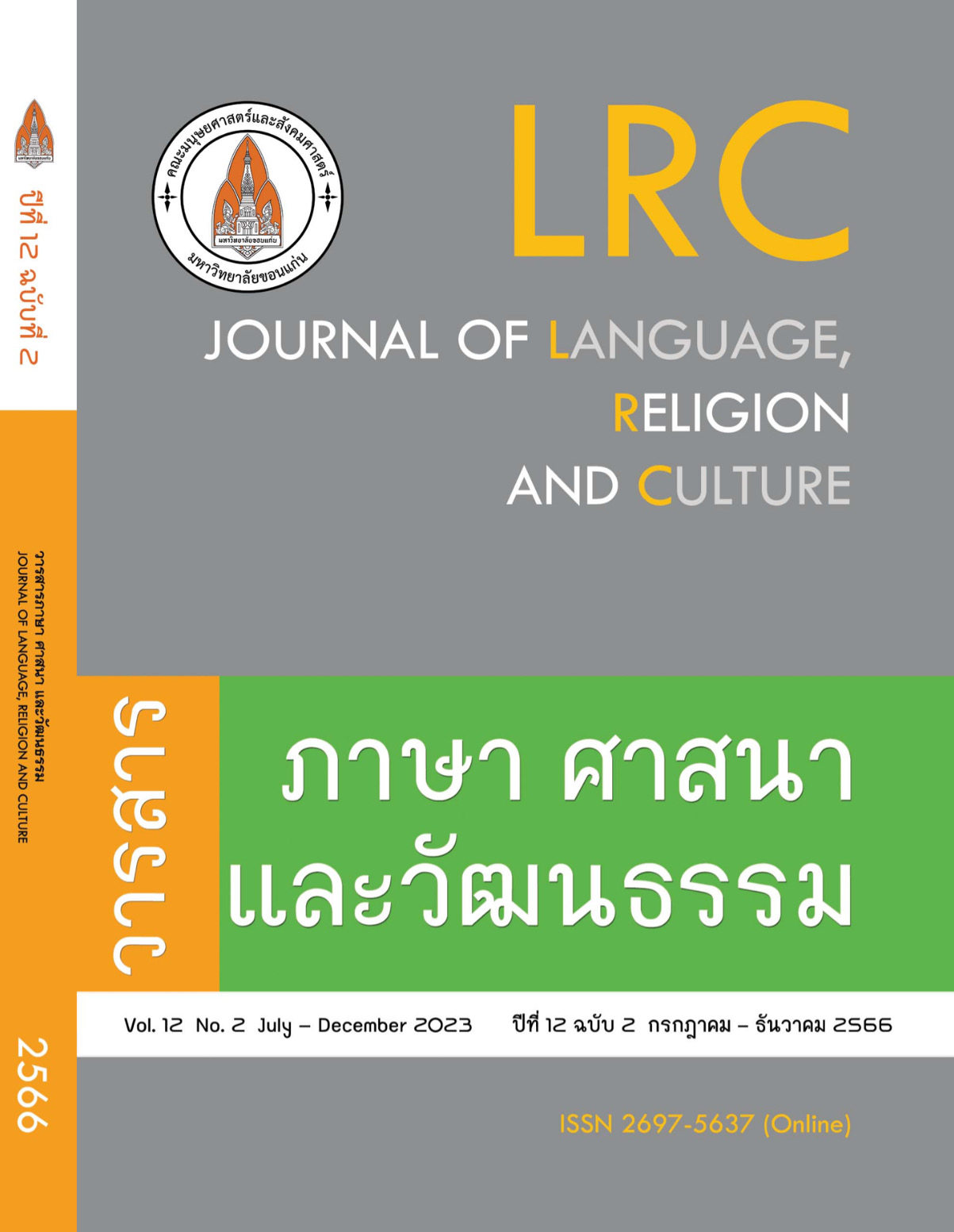Semantic Denotations of Reduced Adverbial Clauses in Applied Linguistics Research Articles and Novels
ความหมายเชิงอรรถศาสตร์ของวิเศษณานุประโยคที่ถูกลดรูปใน บทความวิจัยภาษาศาสตร์ประยุกต์และนวนิยาย
Keywords:
semantic denotations, reduced adverbial clauses, applied linguistics research articles, novelsAbstract
This study examines semantic denotations of reduced adverbial clauses in applied linguistics research articles and novels. Whilst previous studies focused on the materials of sports news articles. cookbooks, and the writing of EFL learners, this study contributes to the view of applied linguistics research articles and novels. So, the use of reduced adverbial clauses between formal texts and informal text could be explored. There are four journals including Journal of English for Academic Purposes, Journal of English for Specific Purposes, PASAA Journal and LEARN Journal as indexed in the SCOPUS database since these journals are internationally well-known. Sources of novels in this study were gathered from Peter Pan (Barrie, 2022), The Secret Garden (Burnett, 2021) and The Adventure of the Blue Carbuncle (Doyle, 2022) due to their best seller status during 2022 to 2023 (www.amazon.com) where everyone can read regardless ages and gender. The data collection in this study is approximately 400,000 words, containing 50 tokens to study semantic denotations of reduced adverbial clauses. The data analysis in this study follows Swan’s (2016) prescriptive grammar where semantic denotations of reduced adverbial clauses into are classified into eight categories. The results show that the reduced adverbial clauses of temporality occur with the highest frequency in both datasets. This phenomenon could be explained by levels of creativity and least effort requirement.
References
Barrie, J. M. (2022). Peter Pan, UK: Chiltern
Burnett, F. H. (2022). The secret garden, UK: Chiltern
Charoenchaikorn, V. (2022). Effects of post-task anticipation during online collaboration writing in L2. PASSA Journal, 64, 68-98.
Doyle, C. A. (2022). The adventure of the blue carbuncle. UK: Penguin Random House.
Fromkin, V., Rodman, R., & Hyams, N. (2018). An introduction to language. USA: Cengage Learning.
Hyland, K., & Jiang, F. K. (2017). Is academic writing becoming more informal?. English for Specific Purposes, 45, 40-51.
Kimura, D. (2023). Diverse conceptualizations of “competence” in second language research and teaching. LEARN Journal: Language Education and Acquisition Research Network, 16(1), 18-27.
Kulprasit, W. (2022). Formative multimodal E-Feedback in second language writing virtual spaces. PASAA Journal, 64(2022), 52-67.
Li, W., & Long, Y. (2022). A Development study on the ordering distribution of temporal adverbial clauses by Chinese EFL learners based on dependency treebank. Chinese Journal of Applied Linguistics, 45(4), 551-565.
Lindenburg, D. (2023). Modes and intersemiotic cohesion in student presentations performed online: An SF-informed multimodal discourse analysis. Journal of English for Specific Purposes, 69, 67-79.
Liu, Y., Tang, R., Lim, F. V. (2023). The use of code glosses in three-minute thesis presentations: A comprehensibility strategy. Journal of English for Academic Purposes, 63, 1-14.
Luzon, M. (2023). Multimodal practices of research groups in Twitter: An analysis of stance and Engagement. Journal of English for Specific Purposes, 70(2023), 17-32.
Melchers, G., Shaw, P., & Sundkvist, P. (2019). World Englishes. Routledge.
Nam, G. (2023). Challenges and constraints of implementing communicative language teaching: Teacher-related vs. non-teacher-related factors. LEARN Journal: Language Education and Acquisition Research Network, 16(1), 75-96.
Nipaspong, P. (2022). The effects of online corrective feedback on university students’s self-regulation in writing. PASSA Journal, 62(2022), 23-51.
O’neill, D. (2005). Talking about new information: the given/new distinction and children developing theory. Janet Wilde Astington & Jodie A. Baird (eds.). In Why language matters for theory of mind. Oxford: Oxford University Press.
Palmour, L. (2023). Assessing oral presentations: An analysis of score-reaching dialogue between EAP Practitioners. Journal of English for Academic Purposes, 62(2023), 1-12.
Phoocharoensil, S. (2022). ELT and AL research trends in Thai SCORPUS-Index journals, PASAA Journal, 64(2022), 163-196.
Radford, A. (2009). An introduction to English sentence structure. Cambridge: Cambridge University Press.
Rakhmasari, D. L. (2022). Reduced Adverbial Clause In English. English Education and Literature Journal, 2(1), 48-57.
Sabiq, A. H. A. (2023). Investigating individual differences, school locality, and management on Indonesian students’ attitudes and motivation in EFL learning. LEARN Journal: Language Education and Acquisition Research Network, 16(1), 726-752.
Sawaki, T. (2023). High use of direct questions and relative absence of promotional intention in Japanese peer-reviewed research article introductions compared to their English counterparts. Journal of English for Specific Purposes, 69(2023), 19-32.
Sakulprasertsri, K. (2022). Device ownership, accessibility and university students’ perceptions of an online foundation English course in Thailand, PASSA Journal, 63(2020), 123-145.
Swan, A. (2016). Practical English usage. Oxford: Oxford University Press.
Tardy, C. M. (2023). How epidemiologists exploit the emerging genres of twitter for public engagement. Journal of English for Specific Purposes, 70(2), 4-16
Widiati, U., Sharif, T.I.S.T., Karmina, S., & Zubaidi, N. (2023). Literacy teaching strategies: Do Indonesian secondary EFL teachers practice what they know? LEARN Journal: Language Education and Acquisition Research Network, 16(1), 339-364.
Wongkittiporn, A., & Chitrakara, N. (2019). Control constructions in British and American English. Bulletin of the Transilvania University of Brasov. Series IV: Philology and Cultural Studies, 19-48.
Wongkittiporn, A. (2021). Adverbial clauses in English cookbooks. Thoughts, 2021(1), 72-104.
Wongkittiporn, A. (2022). Semantic denotations of adverbial clauses in novels and political news articles and sports new articles. Academic Journal for the Humanities and Social Sciences Dhonburi Rajabhat University, 5(2), 9-24.
Yang, L., & Zhang, L., J. (2023). Self-regulation and student engagement with feedback: The Case of Chinese EFL student writers. Journal of English for Academic Purposes, 66(2023), 1-14.
Zhang, W. & Cheung, Y. L. (2023). The different ways to write publishable research articles: Using cluster analysis to uncover patterns of APPRAISAL in discussions across disciplines. Journal of English for Academic Purposes, 63(2023), 1-14.
Zhang, Z. (2023). Tracing development: Feedback orientations and knowledge construction in master’s theses, Journal of English for Academic Purposes, 63 (2023), 1-12.
Zuaro, B. (2023). Content adaptations in English-medium instruction: Comparing L1 and English medium lectures. Journal of English for Academic Purposes, 70(2023), 267-279.
Downloads
Published
How to Cite
Issue
Section
License
Copyright (c) 2023 JOURNAL OF LANGUAGE, RELIGION AND CULTURE

This work is licensed under a Creative Commons Attribution-NonCommercial-NoDerivatives 4.0 International License.







